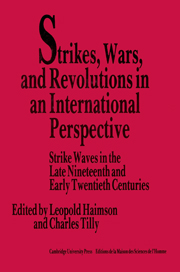 Strikes, Wars, and Revolutions in an International Perspective
Strikes, Wars, and Revolutions in an International Perspective Published online by Cambridge University Press: 25 March 2010
If we turn back the clock to the early 1890s, or more precisely to the sketches drawn for us (largely by radical members of the intelligentsia) of the masterovye, the skilled workers employed in St. Petersburg's mechanical and metalprocessing plants, we can draw a number of concurring generalizations about the characteristics that then distinguished these workers – and more generally the world of the zavodskiye (the workers, skilled and unskilled, employed in various plants of the capital's heavy industries) – from the largely unskilled and lower paid workers employed in the city's light industries, (most of them in textile and food-processing enterprises):
One of these concurring generalizations centers on the learning process involved in skilled metalworkers' mastering of their trade and the key role that this process of mastering ultimately played in these workers' gains of greater autonomy in the production process, as well as in their economic, social, and cultural advancement. Greater autonomy because, in the semiartisanal conditions that still distinguished the operations of St. Petersburg's mechanical and other metal-processing plants (including even the larger ones), the acquisition of the various skills attendant on the mastery of the trade implied for a machinist and other skilled workers employed in mechanical and other metal-processing plants the assumption of greater control over their own work: greater independence in the exercise of the various decisions involved in the work process, in the tempo at which this work was performed, and more generally in the degree of freedom attained in this work performance from interference by supervisory personnel.
To save this book to your Kindle, first ensure [email protected] is added to your Approved Personal Document E-mail List under your Personal Document Settings on the Manage Your Content and Devices page of your Amazon account. Then enter the ‘name’ part of your Kindle email address below. Find out more about saving to your Kindle.
Note you can select to save to either the @free.kindle.com or @kindle.com variations. ‘@free.kindle.com’ emails are free but can only be saved to your device when it is connected to wi-fi. ‘@kindle.com’ emails can be delivered even when you are not connected to wi-fi, but note that service fees apply.
Find out more about the Kindle Personal Document Service.
To save content items to your account, please confirm that you agree to abide by our usage policies. If this is the first time you use this feature, you will be asked to authorise Cambridge Core to connect with your account. Find out more about saving content to Dropbox.
To save content items to your account, please confirm that you agree to abide by our usage policies. If this is the first time you use this feature, you will be asked to authorise Cambridge Core to connect with your account. Find out more about saving content to Google Drive.